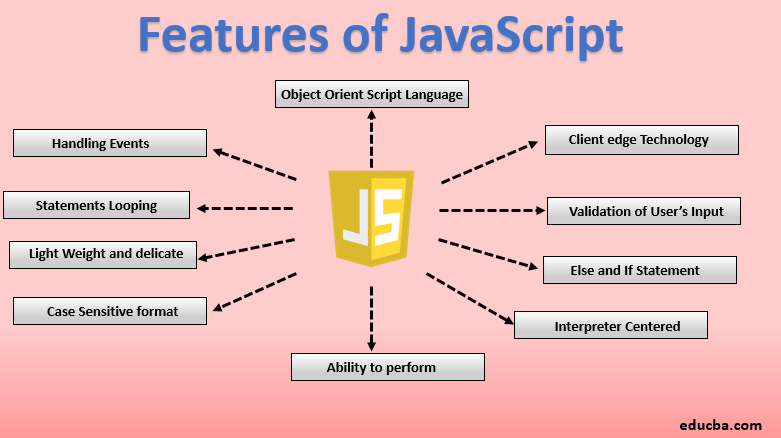JavaScript Features

JavaScript is a versatile programming language that has evolved significantly since its creation.
Here are some key features of JavaScript:
-
Object-Oriented:
- JavaScript is an object-oriented programming language. It supports the creation and manipulation of objects, making it suitable for building modular and reusable code.
-
Interpreted Language:
- JavaScript is an interpreted language, which means that it doesn't need to be compiled before execution. The browser's JavaScript engine interprets the code directly.
-
Dynamic Typing:
- JavaScript is dynamically typed, meaning variable types are determined at runtime. This flexibility allows for easier code development but requires careful attention to variable types during execution.
-
Prototype-based Inheritance:
- JavaScript uses prototype-based inheritance, where objects can inherit properties and methods directly from other objects. This differs from class-based inheritance found in languages like Java or C++.
-
Functional Programming Support:
- JavaScript supports functional programming paradigms, allowing functions to be treated as first-class citizens. This includes the ability to pass functions as arguments, return functions from other functions, and assign functions to variables.
-
Closures:
- JavaScript supports closures, allowing functions to "remember" the scope in which they were created. This feature is useful for creating private variables and functions.
-
Asynchronous Programming:
- Asynchronous programming is a crucial feature in JavaScript, facilitated by features like callbacks, promises, and async/await. This enables the execution of non-blocking code, making it suitable for handling tasks such as AJAX requests and event handling.
-
Event-Driven Programming:
- JavaScript is inherently event-driven, making it well-suited for handling user interactions. DOM events, such as clicks and keypresses, can trigger JavaScript functions to respond dynamically.
-
Cross-platform Compatibility:
- JavaScript is supported by all major web browsers, making it a cross-platform language. Code written in JavaScript can run on various devices and operating systems, providing a consistent experience for users.
-
Client-Side Scripting:
- JavaScript is primarily used for client-side scripting, allowing developers to enhance the user experience by creating dynamic and interactive web pages.
-
Server-Side Development:
- With the introduction of Node.js, JavaScript can also be used for server-side development. This enables developers to use a single language (JavaScript) for both client-side and server-side code, promoting code reuse and consistency.
-
Extensive Ecosystem:
- JavaScript has a rich ecosystem of libraries and frameworks, such as React, Angular, Vue.js, and Express.js, which simplify and accelerate the development of web applications.
These features contribute to the popularity and versatility of JavaScript, making it a powerful language for a wide range of applications, from building interactive web pages to server-side development and even mobile app development.
Thank you.
